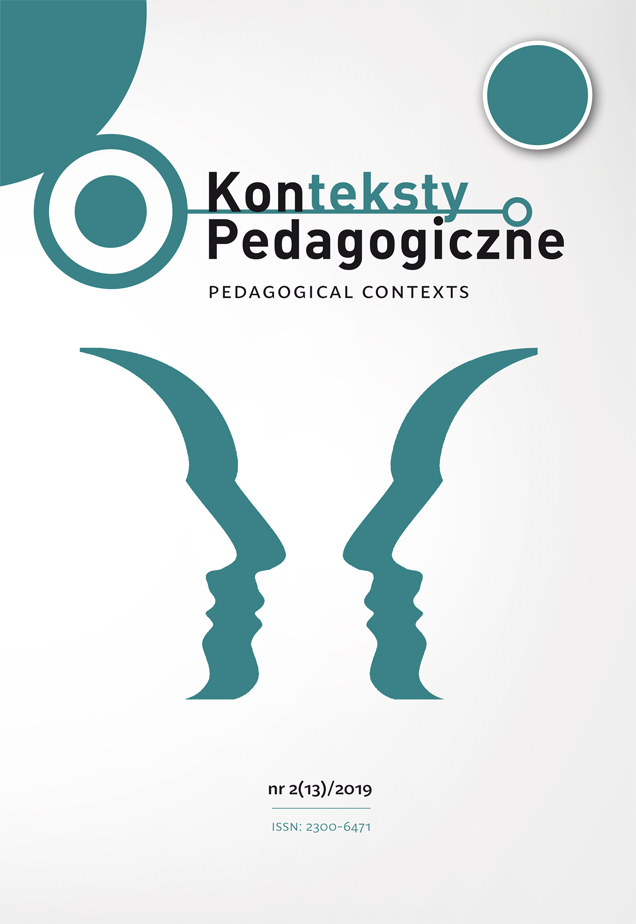Abstract
Teachers influence the student with their individuality, hence their knowledge, skills and attitudes in the field of diagnosis and therapy are the essence of the educational and didactic activities undertaken by the teacher in the school space. Competences are not a permanent value, they can be subject to change and they constitute the developmental professional potential of the teacher in the motivational, cognitive, emotional and social areas.
The article presents a selected area of research concerning the sources of teaching knowledge and skills in the fields of diagnosis and therapy and their self-assessment, taking into account the nominal variables of age and additional qualifications. The presented text is part of a larger research project devoted to the diagnostic and therapeutic competences of teachers of public, inclusive and special schools.
References
Barłóg, K. (2008). Wspomaganie rozwoju dzieci z niepełnosprawnością intelektualną w stopniu lekkim w różnych formach edukacji wczesnoszkolnej [Supporting the Development of Children with Mild Intellectual Disabilities by Various Forms of Early Childhood Education]. Rzeszów: Wydawnictwo Uniwersytetu Rzeszowskiego.
Bocian-Waszkiewicz, B. (2015). Uczeń ze specjalnymi potrzebami edukacyjnymi w szkole masowej – przygotowanie i zadania nauczyciela [A Student with Special Educational Needs at Public School – Preparation and Tasks of a Teacher]. Student Niepełnosprawny. Szkice i Rozprawy, 15(8), 85–98.
Cieślikowska, J. (2007). Szkolne zadania z zakresu promocji zdrowia a ogólnopedagogiczne kompetencje nauczycieli do ich podejmowania [Health Promotion Tasks at School and Teachers’ General Pedagogical Competence to Undertake Them]. In: J.A. Malinowski and A. Zandecki (eds.), Środowisko – młodzież – zdrowie. Pedagogiczne i psychologiczne wymiary zagrożeń życia i rozwoju młodzieży [Environment – Youth – Health. Educational and Psychological Dimensions of Threats to Life and Development of Youth] (pp. 207–212). Toruń: Wydawnictwo Akapit.
Dróżka, W. (2002). Nauczyciel – autobiografia pokolenia [Teacher – Autobiography of the Generation]. Kielce: Wydawnictwo Akademii Świętokrzyskiej.
Gajdzica, Z. (2001). Nauczyciel edukacji wczesnoszkolnej w zreformowanej szkole powszechnej jako organizator procesu kształcenia dziecka upośledzonego umysłowo w stopniu lekkim [Early Childhood Education Teacher in a Reformed Public School as the Organizer of the Education Process for a Child with a Minor Intellectual Disability]. In: Z. Polak (ed.), Pedagogika specjalna w reformowanym ustroju edukacyjnym [Special Needs Education in the Reformed Education System]. Lublin: Wydawnictwo Uniwersytetu Marii Curie-Skłodowskiej.
Gajdzica, Z. (2011). Założenia znam z… – czyli o kreowaniu opinii nauczycieli na temat przemian kształcenia specjalnego [I Know the Assumptions from… – About Creating Teachers’ Opinion on the Transformation of Special Education]. Teraźniejszość – Człowiek – Edukacja, 4(56), 65–73.
Gajdzica, Z. (2013). Źródła wiedzy polskich i czeskich nauczycieli [Sources of Knowledge of Polish and Czech Teachers], Studia Edukacyjne, 24, 103–114.
Grzesiak, J. (2008). Autoewaluacja wyznacznikiem kompetencji pedagogicznych współczesnego nauczyciela [Self-evaluation as a Determinant of Pedagogical Competence of Contemporary Teacher]. In: K. Żegnałek (ed.), Kompetencje współczesnego nauczyciela [Competences of a Modern Teacher] (pp. 39–50). Warszawa: Wydawnictwo Wyższej Szkoły Pedagogicznej TWP.
Jachimczak, B. (2012). Przygotowanie nauczycieli wychowania przedszkolnego do realizacji wybranych zadań z zakresu pomocy psychologiczno-pedagogicznej [Preparation of Pre-school Teachers to Perform Selected Tasks in the Field of Psychological and Pedagogical Assistance]. Studia Edukacyjne, 21, 163–175.
Kuźma, J. and Morbitzer, J. (eds.) (2005). Edukacja – szkoła – nauczyciel [Education – School – Teacher]. Kraków: Wydawnictwo AP.
Pearson, A.T. (1994). Nauczyciel. Teoria i praktyka w kształceniu nauczycieli [The Teacher: Theory and Practice in Teacher Education], transl. A. Janowski and M. Janowski. Warszawa: Wydawnictwa Szkolne i Pedagogiczne.
Pytlarczyk, J. (2007). Diagnoza rozwoju dziecka podstawą planowania procesu edukacyjnego w przedszkolu i szkole [Diagnosis of Child Development as a Basis for Planning the Educational Process in Kindergarten and School]. Warszawa: Juka.
Strykowski, W. (2005). Kompetencje współczesnego nauczyciela [Competences of a Modern Teacher]. Neodidagmata, 27–28, 15–28.
Szumski, G. and Firkowska-Mankiewicz, A. (cooperation). (2010). Wokół edukacji włączającej. Efekty kształcenia uczniów z niepełnosprawnością intelektualną w stopniu lekkim w klasach specjalnych, integracyjnych i ogólnodostępnych [Around Inclusive Education. Effects of Teaching Students with Mild Intellectual Disabilities in Special, Integration and Public Classes]. Warszawa: Wydawnictwo APS.
Tersa, K. (2014). Kompetencje diagnostyczne nauczycieli. Oczekiwania i wyzwania [Teachers’ Diagnostic Competences. Expectations and Challenges]. Niepełnosprawność. Dyskursy Pedagogiki Specjalnej, 16, 90–105.
Uberman, M. and Mach, A. (2016). Kompetencje nauczyciela edukacji wczesnoszkolnej w szkole ogólnodostępnej w pracy z dzieckiem z niepełnosprawnością [The Competences of Early Childhood Education Teacher Working with a Child with Disabilities in a Public School]. Lubelski Rocznik Pedagogiczny, XXXV(3), 165–185.
Wyczesany, J. (2002). Biopsychospołeczna koncepcja niepełnosprawności i jej znaczenie dla funkcjonowania dziecka o specjalnych potrzebach edukacyjnych [The Biopsychosocial Concept of Disability and its Implications for the Functioning of Children with Special Educational Needs]. In: J. Wyczesany and A. Mikrut (eds.), Kształcenie zintegrowane dzieci o specjalnych potrzebach edukacyjnych [Integrated Education for Children with Special Educational Needs] (pp. 75–91). Kraków: Wydawnictwo Naukowe Uniwersytetu Pedagogicznego.
In accordance with the recommendation of the Ministry of Science and Higher Education, which aims to counteract the practice of “ghostwriting” and “guest authorship,” all authors submitting their text for publication should attach an author’s statement which declares the contribution of each of the authors to the article. The printed and signed statement should be delivered by mail or other means to editor-in-chief Joanna Skibska or sent in the form of a scan to the following e-mail address: redakcja@kontekstypedagogczne.pl. The authors will not receive remuneration for publishing their papers. The editors reserve the right to make minor editorial changes to the articles which will not affect the substance of the article. We encourage all authors to prepare their articles in accordance with the guidelines for manuscript preparation. Download pdf file.
Authors transfer all copyrights and grant the journal the right of first publication with the work simultaneously licensed under a Creative Commons Attribution License that allows others to share the work with acknowledgement of the work's authorship and initial publication in this journal. All authors agree to the publishing of their email addresses, affiliations and short bio statements with their articles during the submission process.

